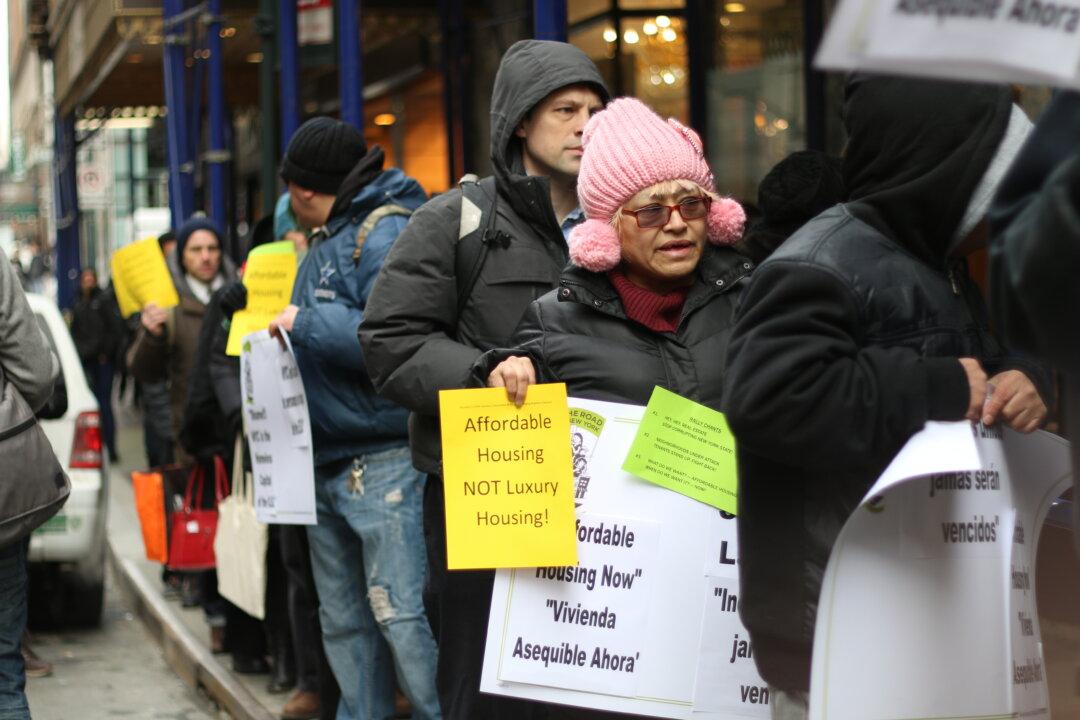NEW YORK—Inside the plush and gilded conference room at the Roosevelt Hotel on Tuesday a group of real estate agents listen as a panel of experts talk about property laws, real estate trends, and best practices in the industry.
Outside the hotel a smaller group of protesters pace the sidewalk, holding signs with slogans like “Stop Displacement Now” and “Affordable Housing Not Luxury Housing!”
“Big real estate has been the absolute most aggressive at removing affordable housing from the city stock of housing and making unbelievable profits in doing so,” said Brandon Kielbasa, a housing specialist with the tenant advocacy group, Cooper Square Committee. Cooper Square campaigns for environmental and affordable housing on the Lower East Side.
He says that “Big Real Estate” has been exploiting loopholes in the laws to make big profits, and at the residents’ expense. “I work with thousands of tenants each year on the Lower East Side who are being displaced from their community and many of them don’t have any place to go,” says Kielbasa.
The symposium, “Landlords Schooling Landlords”, was sponsored by LandlordsNY, a membership-based networking group for the real estate industry. The keynote speaker, Joseph J Sitt, is chairman of Town Residential, a large brokerage firm in New York, and the President and CEO of Thor Equities, an international real estate development company.
Sitt says he is concerned about affordable housing in the city, despite what protesters may think. “My particular issue is making sure we have more affordable housing stock,” he said. “People need to be able to live and work at all income levels in New York City.”
What is driving up prices in the City, he says, is the booming movie and tech business, and the fact that the average Joe has more money is his pocket. International instability, Sitt says, also plays a role.
“If you’re from booming countries like China or Russia with tremendous wealth, you say to yourself ‘Well, I’m a little scared. What happens if the regime changes?’ What happens if the government authorities come down?’”
If anything comes down, investors from these countries want to make sure their money is in a safe place—a place like New York.
The Association of Foreign Investors in Real Estate (AFIRE) has consistently ranked New York City as one of the best real estate investments in the US. New York City’s 2013 score hovered around 35 as compared with the second best investment City, San Francisco, at about 23.
Tale of Two Cities
“Mayor de Blasio campaigned with his “Tale of Two Cities” and this is what we’re talking about,” said Kielbasa.
The mayor made a campaign promise to create 200,000 new units of affordable housing over the next 10 years to combat soaring rental fees. While he does not have the ability to set a price ceiling on rents, he has a few other tools at his disposal.
One not-so-popular proposal is to borrow $1 billion of the City’s $144 billion pension fund to build new residences. This proposal has largely been frowned upon because if that money is not collecting interest, it is not maximizing pensioners’ retirement funds.
Another idea he has talked about is inclusionary zoning, which would force developers to build affordable units, or make them give back to the city in some other way. He has also talked about protecting rent-stabilized units, something that the real estate industry has strongly opposed.
“If we’re able to buy out stabilized tenants, we’ll buy them out and, a lot of times with stabilized tenants, you get yourself caught up into fights in landlord tenancy court,” said Michael Zampetti, a managing member at Slate Property Group which attended the symposium.
Kielbasa says for that to change, the fight will have to be taken to Albany. “That is absolutely where the fight needs to happen, [and] is going to happen in 2015. Tenants that you see here and thousands of others are piling into busses and going up to Albany and doing demonstrations around the city to strengthen the rent laws for the 2015 rent stabilization law renewal that is happening then.”
Holly Kellum is a special correspondent in New York.





